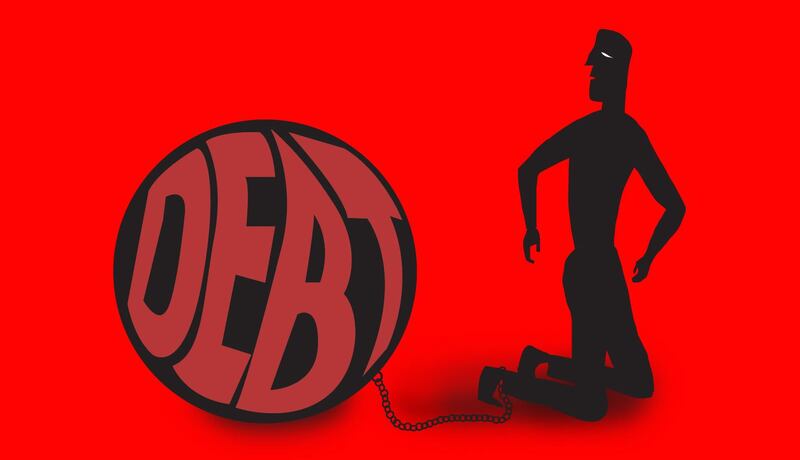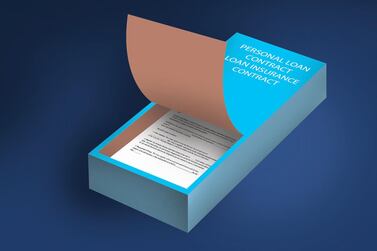I am Emirati and currently owe Dh2.69 million on a 20-year loan I took out in April 2018. I was recently reading the Central Bank of the UAE regulations, issued in 2011, and noticed some irregularities. I want to understand if I have been dealt with unfairly or whether I am understanding my finances in the wrong way. I understand there is a National Loan Scheme but I’m not sure if I can apply for it. As my outlook seems very depressing, do I have any options?
I first took on a personal loan of Dh250,000 in 2005 when I was a student. I then topped up the loan regularly to about Dh1.2m in 2010. At one point I was asked to register a trade name to count it as a business loan, which never existed. At the time, it was a 15-year loan at an interest rate of 10.5 per cent.
I then transferred to another bank, before it was finally taken on by the existing lender in 2018. As part of the latest agreement, the lender consolidated all my debts, including an interest-free loan from my company, and gave me cash. According to the Central Bank regulations I have read, the bank should not have increased my debt burden among other discrepancies. These discrepancies are:
• The loan amount cannot be more than 20 times the salary or total income of the borrower.
I have a salary of Dh62,500, so my loan is more than 20 times this amount. Is this allowed?
• The repayment period should not exceed 48 months.
My loan is being repaid over 20 years, which means I’m paying back Dh4.2m if you include the interest.
• All debt repayment deductions must not exceed 50 per cent of the individual’s gross salary.
My current fixed monthly repayments are as follows:
Personal loan: Dh18,700
Credit card: Dh4,000 (this is 5 per cent of the Dh80,000 I owe)
Credit card easy payment loans: I have four totalling Dh9,487 (Dh1,165; Dh1,478; Dh2,091 and Dh4,753)
Car Loans: I have two totalling Dh6,883 (Dh3,597 and Dh3,286)
Total: Dh39,070
This total exceeds the debt-burden ratio of 50 per cent and does not include my rent and living expenses, which take me beyond my means.
• Banks and finance companies are prohibited from taking blank cheques for granting credit.
On previous loans I’ve taken out, I signed cheques without putting in an amount so technically they are blank cheques.
• A car loan should not exceed 80 per cent of the value of the financed vehicle.
On my car loans, the dealer increased the value in agreement with the bank agent so I did not have to pay the 20 per cent down payment. I now find myself paying more interest which is against the above regulation.
• A bank accepting a loan transfer that exceeds certain limits, cannot increase or extend an additional loan or finance to the borrower.
When I switched my loan to bank two and now my current lender, both banks extended additional loans, as well as cash and a longer repayment period, which is against the above regulations.
Separately, in 2016, I was diagnosed with cancer, so a previous credit card with an outstanding balance of Dh186,000 was paid by insurance. Does this apply to personal loans as well (as that means that should have been covered too)?. I have now recovered from my illness.
I am 35 and work in the oil and gas sector. My monthly expenses outside the debt repayments are:
Rent: Dh7,000
Utility bills: Dh4,000
Housemaid: Dh2,000
Groceries: Dh8,000
Education: D2,500 (from next year the company will pay)
Transport running costs: Dh3,500
Miscellaneous: Dh2,000
Total: Dh29,000
Do I complain to the Central Bank about these issues or can you advise me better on whether the credit has been issued illegally? TH, UAE
Debt panellist 1: Philip King, head of retail banking at Abu Dhabi Islamic Bank
You have done the right thing in looking to confront your mounting borrowing. It is correct that since 2011 the UAE Central Bank regulations stipulate that a loan amount should not exceed 20 times the person’s salary nor have a repayment period of longer than 48 months.
You have been accruing debt since before these regulations were applied, and so just because it now breaches the limits set by the Central Bank to prevent further lending, it does not mean that you have an excuse to avoid paying back what you owe. However, you should still take up your case with the Central Bank as your banks should not have burdened you with more debt since 2011 if you were already above these limits. Some of the other practices you describe also contravene the Central Bank regulations.
The National Loan Scheme was designed for cases just like yours: a personal loan granted before May 2011 which exceeds a settlement period of four years and entails a monthly deduction amount of 50 per cent of income. There are a number of banks participating in the scheme who may be able to support you in creating a more sustainable repayment schedule.
Before applying, you need to ensure that you have all of your personal and financial information, including monthly incomings and outgoings, documented so that the bank has a clear understanding of your borrowing history and can make an accurate decision. You need to show a commitment to pay off your debt, on time and in full.
As part of this effort, you should also seek to reduce your monthly expenses, particularly your household spending, to free up your salary to bring your debt down to sustainable levels.
Debt panellist 2: Ambareen Musa, founder and chief executive of Souqalmal.com
It is obvious that a lack of centralised credit reporting and sound debt-related advice from banks has led to your debts spiralling out of control. Before the launch of the Al Etihad Credit Bureau, banks had no way of tracking a potential borrower's creditworthiness. Therefore, it looks like your Emirati status and high salary profile made banks approve higher loan amounts and loan top-ups in the past.
You could be able to find some much-needed respite from your debts, thanks to the National Loan Scheme, which was launched last year with an aim to ease the debt burden on Emiratis. The scheme helps consolidate the borrower's loans (issued prior to May 2011) and limits the monthly repayments to 50 per cent of the borrower's income. The tenure under this scheme is also capped at four years, with the maximum interest rate being capped at three-month Eibor (Emirates Interbank Offered Rate), which is about 2 per cent.
The National Loan Scheme specifically targets debts that have accumulated over a long period, and have gone past their original tenure and maximum settlement amount. It helps borrowers like you, who are struggling with monthly debt instalments that exceed more than half of their monthly income. Since your original loan and top-up loan had originated before May 2011, you may be able to take advantage of this programme. It would be best to check with your primary lender as well as other leading banks, to confirm your eligibility to participate in the scheme.
Debt panellist 3: Steve Cronin, founder of DeadSimpleSaving.com
You are addicted to debt like people are addicted to cigarettes. I appreciate it is not at all easy to quit and more satisfying to blame the banks. They are certainly not blame-free. But at some point you have to look within, understand what went wrong and make sure it doesn’t happen again. Otherwise, even if all your debt was magically waived, you could find yourself in a mess again in 10 years’ time.
You are living beyond your means. While the regulations are there as a last resort to prevent people blowing up their financial lives and banks taking advantage, you have to take responsibility.
Take some time to reflect, starting with that first loan you took on with an unsustainably high interest rate. Did you really need it? Living a low-debt life may not be as fun but it is far less stressful in the long run.
While pursuing the banks, find ways to pay off your debt faster so you won’t have to pay millions in interest. You have two levers under your control — boosting income and reducing expenses. Look for a payrise or a job with better pay. Strive for more responsibility. Maybe your wife needs to take on a job or a better-paid role. Maybe you have talents that can be channelled into side hustles that bring in money also.
You need to bring your family on board too with a new five-year plan to turn your life around. Spending Dh29,000 per month on living expenses means you don’t have an extravagant lifestyle, but you need to spend less.
You may need a fixed budget for each major category and to stick to it rigorously. Slash big costs that add no value as well as all the little costs (groceries) that add up. When your salary comes in, move the amounts needed for debt payments immediately into a separate account. Then you will know how much you have to live on for the month. As you get more disciplined, try to build up a fund for overpaying your debt to reduce it faster. Prioritise your credit card debt, as that will grow rapidly — any new expenditure must be paid off in full each month.
The Debt Panel is a weekly column to help readers tackle their debts more effectively. If you have a question for the panel, write to pf@thenational.ae









